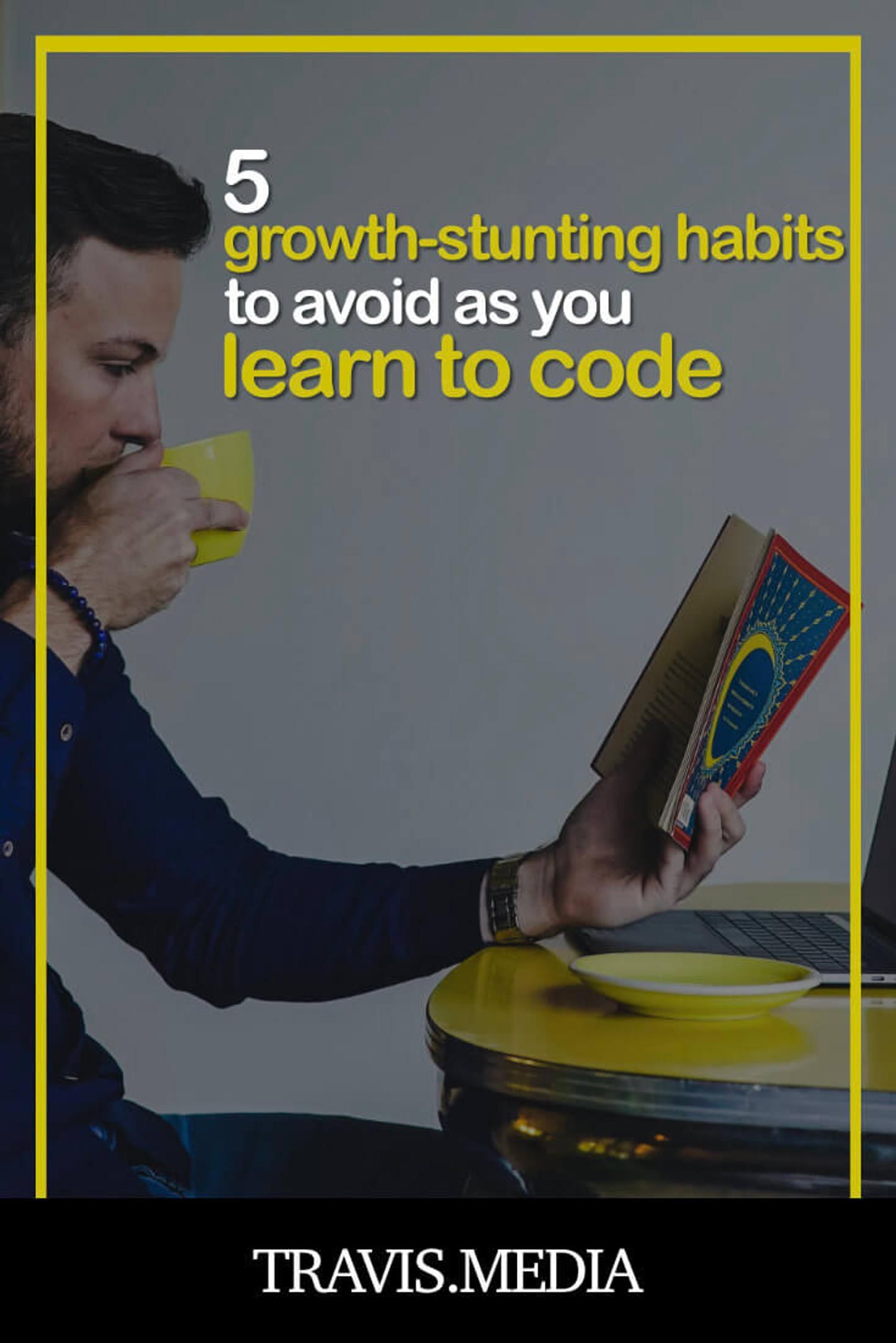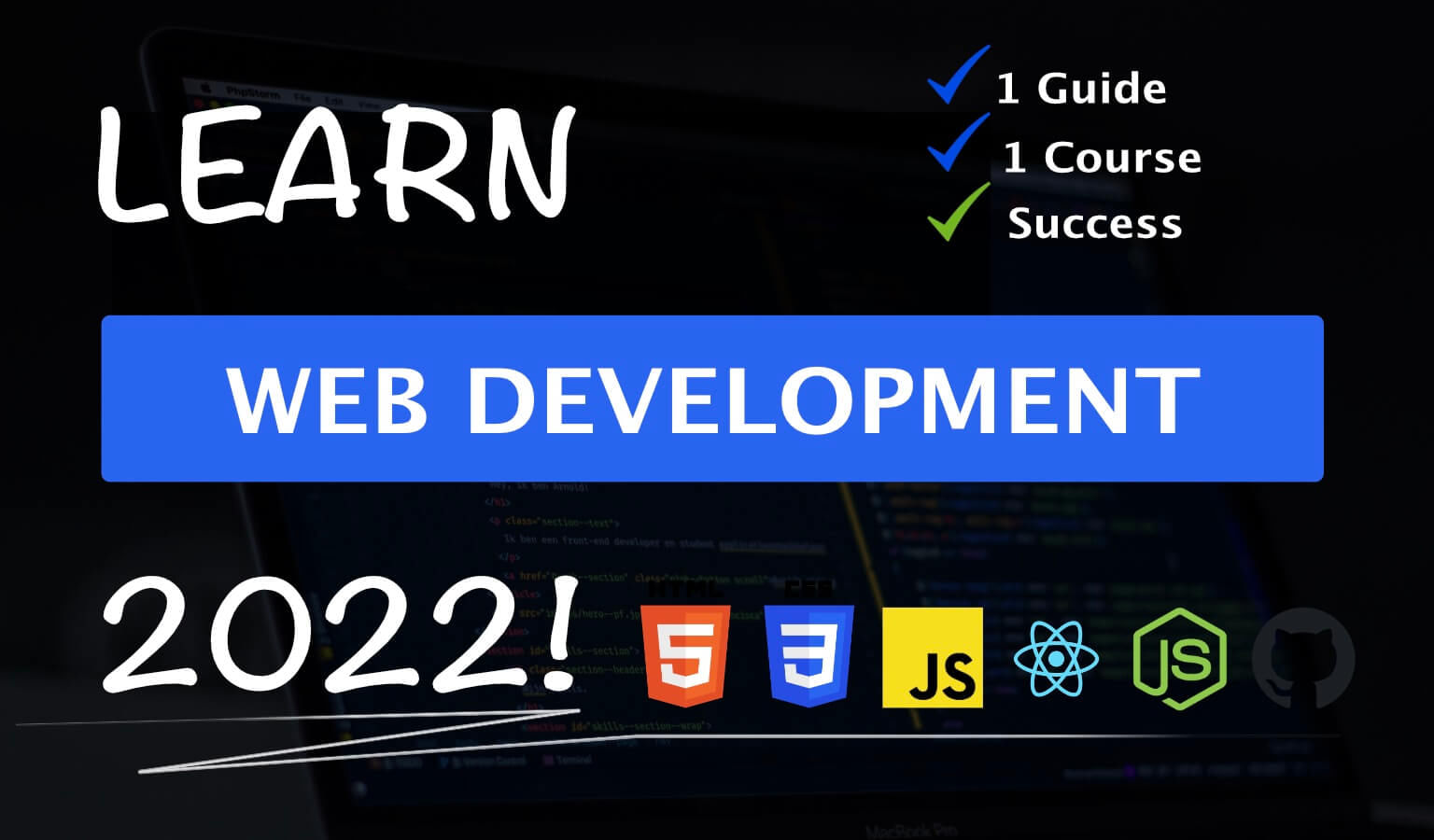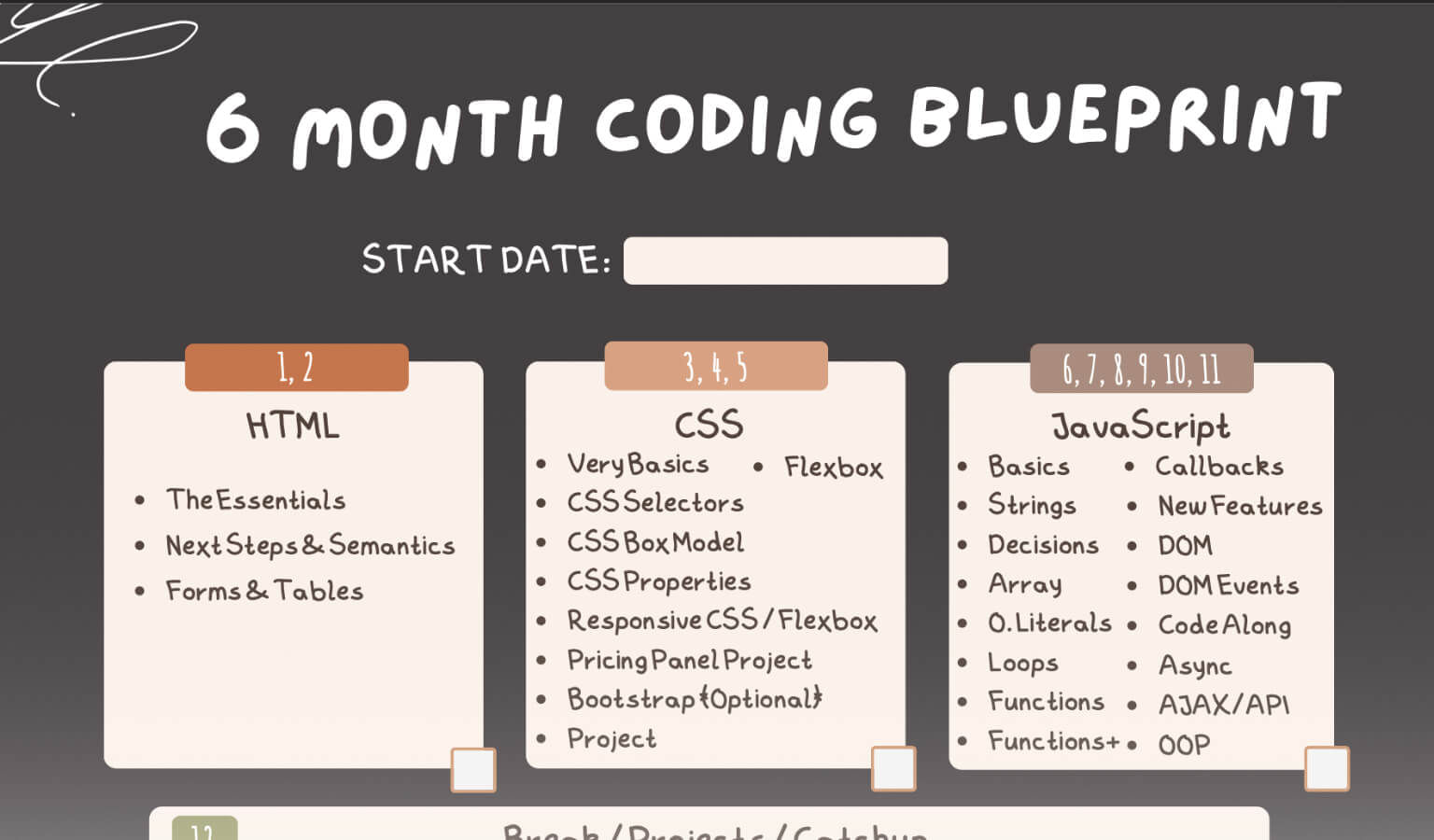Are you learning to code at a good pace and making steady progress toward your goals, or are you running into roadblocks and setbacks that keep you feeling less confident of your career development? In this post you will discover 5 growth-stunting habits that you must avoid as you learn to code and progress as a new developer.

As technology continues to blow peoples' minds, the field of software and web development will continue to be in demand.
According to the Bureau of Labor Statistics, "employment of software developers is projected to grow 24 percent from 2016 to 2026, much faster than the average for all occupations."
In addition, employment of web developers is projected to grow 15 percent from 2016 to 2026
This is an exciting time to learn to code! You are in demand!
But there is one problem: Competition.
If everyone is learning to code, what assurance do you have that you will stand out among the crowd….that your less robust resume or GitHub page will be preferred….or that you will gain enough knowledge to suceessfully do the job?
Well, as some unknown author once said:
Today's progress was yesterday's plan.
That's important.
Your progress is determined by the plans you put forth!
In this post I want to give you a plan of exclusion….a plan to remove 5 habits that may just be keeping you from progressing as you learn to code.
Take these 5 habits, and run through each one removing the barriers necessary to assure your success as a coder and computer programmer.
5 Growth-Stunting Habits To Avoid As You Learn To Code
1. Emphasizing Process over Progress
This is, in my opinion, one of the biggest barriers to progressing to that next level as you learn to code.
Let me give an example to help explain:
Think about the great blues guitarist Mississippi John Hurt. Aside from teaching himself to play guitar, he learned techniques from a few local, "unknown" blues artists in his town. He only had a few others to bounce ideas off of and every chance to connect was a meaningful encounter that he would use to become a better guitarist.
Note that phrase…"to become a better guitarist."
He did not spend his time looking for more and more people to learn from but instead gleaned from these people in order to become better in his guitar playing.
His goal was the progress, not so much the process. The people were part of his process, but they were a means to an end…progress.
Fast-forward 60 years and a Google search for "learn to play blues guitar" gives me over 4 million results!
Bringing this back to coding, there are hundreds and hundreds of resources, from online courses to videos to ebooks, that will teach you to code.
And the important thing is that for the most part they all will teach you the same thing!!
And this is why it comes first in the list of our 5 crippling habits:
because we can actually spend all of our time shifting around to different courses and subscription sites learning to code, and never actually make ANY progress!
The many options we have actually become the barrier.
Just compare it with the blues example: If we just had two choices out there to choose from, I think we would have an easier ability to focus and make progress at a faster rate. Because we would come face to face with progress alone…not the process!
Now I am not saying all of the resources are bad. In fact, its a great thing.
But I am saying that you should take a step back and evaluate whether you are spending all your time in the process (jumping from Treehouse, to Codecademy, to Bloc, to Wes Bos's courses, to Lynda), so much so that you are not really making progress in the coding itself.
2. Comparing yourself to others
When I was learning to code it seemed like everyone else was getting it so easily while I was the one with all the stupid questions.
We had a Slack channel at Bloc and when I actually mustered up the gusto to ask my questions, they would get answered by all the students instead of the instructors!!
What the world. Were my questions really that easy?
As we learn to code, all sorts of people are going to show up on our radar that are code masters.
But the truth is, they are either seasoned developers or they had a head start in it.
And to take it a step further, when you ask questions, you are going to be answered by all of the people who have the answer. So you are not dumb, because all of the other "dumb" people are stalking your question quietly waiting for someone else to answer it too, they just don't want anyone to know it. You just feel like you are the only one there.
The best piece of advice I can give as you learn to code is this: Don't give a rip what level other people are at and how fast they got there. Be focused more on your own progress and how far you've come.
Becoming a good coder takes time. There is nothing you can do about that. Keep from determining your own worth based on the experience of others. Focus on how far you have come and keep grinding out your own path.
3. Not building stuff
This was another bad habit I formed early.
I would follow tutorials in this way (and I know many of you did too!!):
The instructor would type something out. I would pause it and go type it out. Then he/she would type the next line of code and I would pause and go type that line of code. And I would continue this nonsense until I completed the lesson.
And that moment when they said, "Now you try the next section on your own," I would suddenly feel like I had no clue what to do. So I would either swing over to Google to search out answers or I would just watch their solution, with my little step-by-step copy technique.
Give me a day or two later, and I couldn't tell you a lot about what I learned!
Eventually, as I realized my limitations, I began to really put the effort forth to figure things out on my own when I was asked to.
Then it clicked one day. "I CAN actually write my own programs if I just sit down, apply what I've learned, and grind through my own limited beliefs and do the work." It's hard, but I guarantee when you are finished after hours of searching and creating and tweaking your code, you will have learned a LOT more than just copying the instructor.
And after a while you should be able to create simple apps like a To Do List that adds and removes tasks, or a simple hangman game. You should be able to start with some pseudocode and code it out from scratch.
As you begin to do this, mental barriers will begin to disappear and your confidence will skyrocket
But most importantly, you will learn to code at a much, much faster rate.
4. Dismissing the fundamentals
This often happens when we learn to code in an irregular pattern. For instance, we learn HTML, fall off for a week or two, learn CSS, fall off for a week or two…. and then when we come back we think, "Well I already know HTML and CSS, let's learn something new like Python or JavaScript."
The problem is, you didn't value the fundamentals. After taking a course in them they were "beneath you" to revisit.
As I've said again and again, one can make a lucrative career from knowing CSS alone, and knowing it well. But most of us would find it easy to think of that "CSS master" as a step down from a "real coder."
But there is nothing "less" about HTML and CSS. They are the basic building blocks of web development and should be mastered well. The moment we think we are long past that phase, we start to get weak in the fundamentals, and if you are weak in the fundamentals then your foundation itself becomes messy…and no one likes messy code.
So be sure that you have a solid foundation and don't be afraid to go back and revisit. You should be able to do the majority of HTML and CSS from memory without having to look up a lot. Here's is a blueprint if you want a scheduled refresher on the fundamentals.
5. Not asking for help ("coding pride")
Another thing that happens as we learn to code, when we get a few solid concepts under our belt, is that we immediately start referring to ourselves as "Web Developers," "Web Designers," or "Software Developers."
Now there is nothing wrong with this. Be proud young Jedi ( and drop that word 'aspiring' from your Twitter profile). But once we attach that label to ourselves, we feel a big reluctant to ask others for help. I mean, we're web developers now, we know what we are doing, right?.
This is simply "coding pride." It is the feeling you get when you don't have an answer and are hesitatant to ask for help because you will look like a newbie. Well, you are a newbie! Be proud of it, ask tons of questions, and I guarantee you will not only learn to code quickly and thoroughly, but you will actually gain friends and respect for doinmg so along the way.
There will always be better coders than you. Take advantage of them (in a good way) and drop that pride.
Conclusion
And there you have it. 5 growth-stunting habits you should avoid as you learn to code.
After reading this, can you relate to any of these? I sure can.
Read through them again. Journal about them. But most importantly, come up with some solutions so that you can overcome these barriers and learn to code faster. So that you can get that job…and stand out among the sea of other CodeNewbies.
What growth-stunting habits did you develop as you were learning to code, or habits that you still have that stunt your learning? Let's discuss below.
This page may contain affiliate links. Please see my affiliate disclaimer for more info.



